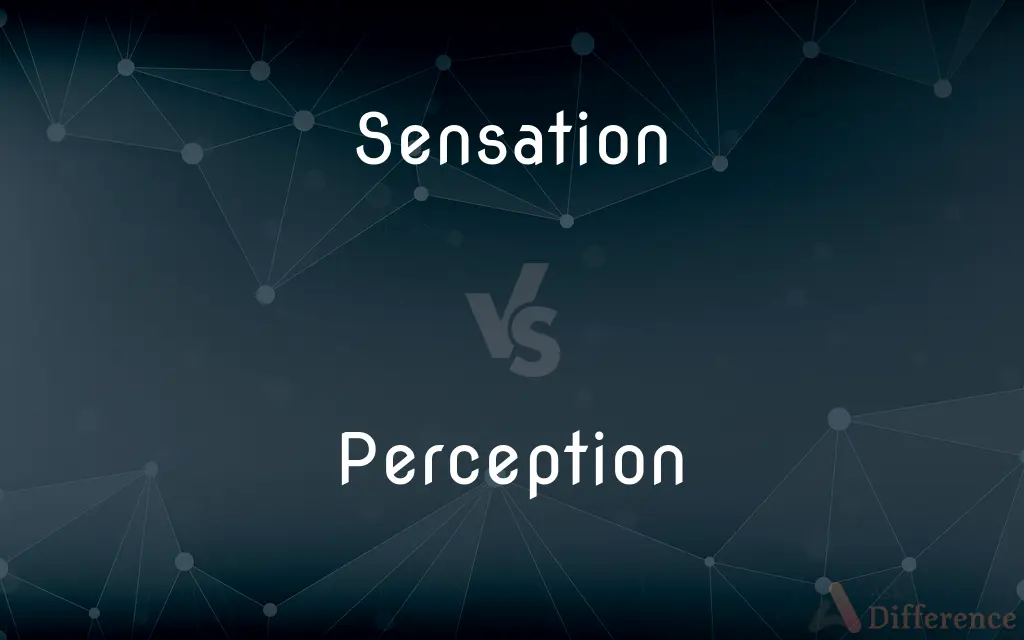Sensation vs. Perception — What's the Difference?
By Tayyaba Rehman & Fiza Rafique — Updated on April 18, 2024
Sensation is the immediate response of sensory receptors to stimuli, while perception is the brain's interpretation of these sensory signals.

Difference Between Sensation and Perception
Table of Contents
ADVERTISEMENT
Key Differences
Sensation involves the detection of physical stimuli from the environment through sensory organs, initiating basic neural responses. On the other hand, perception integrates these initial sensory signals into meaningful patterns and interpretations.
Sensation is primarily physiological, focusing on the body's direct responses to stimuli such as light, sound, or touch. Perception, however, is psychological, involving cognitive processes that make sense of what the stimuli represent.
The process of sensation is relatively straightforward and uniform across individuals, as it directly involves sensory receptors and pathways. In contrast, perception can vary greatly among individuals due to differences in past experiences, expectations, and cultural backgrounds.
Sensation functions as the first step in the pathway of understanding sensory information, merely acknowledging that something is there. Whereas perception comes into play after sensation, providing depth and understanding to what is sensed.
Sensations are raw and unprocessed, presenting basic data to the brain. Perception manipulates this data, often in complex ways, to construct a representation of the world that may differ significantly from the raw stimuli.
ADVERTISEMENT
Comparison Chart
Nature
Physiological
Psychological
Function
Detection of stimuli
Interpretation of stimuli
Dependence
Directly linked to sensory organs
Depends on brain's interpretative capabilities
Variation Among Individuals
Minimal variation
High variation due to cognitive factors
Sequence in Processing
First step in sensory processing
Follows sensation in processing pathway
Compare with Definitions
Sensation
The process by which our sensory receptors and nervous system receive stimuli from the environment.
Sensation occurs when the eye detects light waves.
Perception
A final psychological interpretation of sensory stimuli.
Perception shapes our view of the world around us.
Sensation
A physical feeling resulting from something that happens to or comes into contact with the body.
The sensation of cold water can be shocking.
Perception
The act or faculty of apprehending by means of the senses or of the mind.
His perception of the conversation was different from mine.
Sensation
Immediate and basic experience derived from stimulation of a sense organ.
The sensation of taste is influenced by both smell and texture.
Perception
The ability to see, hear, or become aware of something through the senses.
Age can affect visual and auditory perception.
Sensation
A state or feeling often described in terms of physical perception.
She felt a tingling sensation in her hands.
Perception
Insight, intuition, or knowledge gained by perceiving.
The artist has a unique perception of color and form.
Sensation
A widespread reaction of interest and excitement.
The new movie caused a sensation in theaters.
Perception
A way of regarding, understanding, or interpreting something; a mental impression.
Her perception of the event was influenced by her mood.
Sensation
A perception associated with stimulation of a sense organ or with a specific body condition
The sensation of heat.
A visual sensation.
Perception
Perception (from the Latin perceptio, meaning gathering or receiving) is the organization, identification, and interpretation of sensory information in order to represent and understand the presented information or environment.All perception involves signals that go through the nervous system, which in turn result from physical or chemical stimulation of the sensory system. For example, vision involves light striking the retina of the eye; smell is mediated by odor molecules; and hearing involves pressure waves.
Sensation
The faculty to feel or perceive; physical sensibility
The patient has very little sensation left in the right leg.
Perception
The process of perceiving something with the senses
The perception of a faint sound.
Sensation
An indefinite generalized body feeling
A sensation of lightness.
Perception
An instance of this
Sense perceptions.
Sensation
A state of heightened interest or emotion
"The anticipation produced in me a sensation somewhat between bliss and fear" (James Weldon Johnson).
Perception
The process or state of being aware of something
The perception of time.
Sensation
A state of intense public interest and excitement
"The purser made a sensation as sailors like to do, by predicting a storm" (Evelyn Waugh).
Perception
Insight or knowledge gained by thinking
The perception that inheritance must be coded in DNA.
Sensation
A cause of such interest and excitement
The band's new singer is a sensation.
Perception
The capacity for such insight or knowledge
Theories of how to enhance human perception.
Sensation
A physical feeling or perception from something that comes into contact with the body; something sensed.
Perception
An insight or point of knowledge
The article is full of astute perceptions.
Sensation
A widespread reaction of interest or excitement.
Perception
An interpretation or impression; an opinion or belief
Doctors working to change the public perception of certain diseases.
Sensation
A small serving of gin or sherry.
Perception
The organisation, identification and interpretation of sensory information.
Sensation
An impression, or the consciousness of an impression, made upon the central nervous organ, through the medium of a sensory or afferent nerve or one of the organs of sense; a feeling, or state of consciousness, whether agreeable or disagreeable, produced either by an external object (stimulus), or by some change in the internal state of the body.
Perception is only a special kind of knowledge, and sensation a special kind of feeling. . . . Knowledge and feeling, perception and sensation, though always coexistent, are always in the inverse ratio of each other.
Perception
Conscious understanding of something.
Have perception of time
Sensation
A purely spiritual or psychical affection; agreeable or disagreeable feelings occasioned by objects that are not corporeal or material.
Perception
Vision (ability)
Sensation
A state of excited interest or feeling, or that which causes it.
The sensation caused by the appearance of that work is still remembered by many.
Perception
Acuity
Sensation
An unelaborated elementary awareness of stimulation;
A sensation of touch
Perception
(cognition) That which is detected by the five senses; not necessarily understood (imagine looking through fog, trying to understand if you see a small dog or a cat); also that which is detected within consciousness as a thought, intuition, deduction, etc.
Sensation
Someone who is dazzlingly skilled in any field
Perception
The act of perceiving; cognizance by the senses or intellect; apperhension by the bodily organs, or by the mind, of what is presented to them; discernment; apperhension; cognition.
Sensation
A general feeling of excitement and heightened interest;
Anticipation produced in me a sensation somewhere between hope and fear
Perception
The faculty of perceiving; the faculty, or peculiar part, of man's constitution by which he has knowledge through the medium or instrumentality of the bodily organs; the act of apperhending material objects or qualities through the senses; - distinguished from conception.
Matter hath no life nor perception, and is not conscious of its own existence.
Sensation
A state of widespread public excitement and interest;
The news caused a sensation
Perception
The quality, state, or capability, of being affected by something external; sensation; sensibility.
This experiment discovereth perception in plants.
Sensation
The faculty through which the external world is apprehended;
In the dark he had to depend on touch and on his senses of smell and hearing
Perception
An idea; a notion.
Perception
The representation of what is perceived; basic component in the formation of a concept
Perception
A way of conceiving something;
Luther had a new perception of the Bible
Perception
The process of perceiving
Perception
Knowledge gained by perceiving;
A man admired for the depth of his perception
Perception
Becoming aware of something via the senses
Common Curiosities
Can perception occur without sensation?
Typically, perception cannot occur without prior sensation, as it relies on sensory input to form interpretations.
How do sensation and perception work together?
Sensation provides the raw data, while perception interprets these data to understand and interact with the world.
Does perception affect how we experience sensations?
Yes, perception can modify the experience of sensations by adding context and meaning, influencing how stimuli are experienced.
What is sensation?
Sensation is the process of detecting physical stimuli from the environment through sensory organs.
How does aging affect sensation and perception?
Aging can degrade both sensation (e.g., reduced sensory sensitivity) and perception (e.g., slower cognitive processing).
What is perception?
Perception is the interpretation of these sensory signals by the brain to form a coherent picture of the environment.
What factors influence perception?
Perception is influenced by an individual's past experiences, cultural background, and cognitive biases.
What role does perception play in understanding complex stimuli?
Perception integrates and interprets complex stimuli into a meaningful whole, essential for navigating and understanding the environment.
Are there disorders related to sensation or perception?
Yes, disorders like sensory processing disorder affect sensation, while conditions like schizophrenia can distort perception.
How does sensation differ among individuals?
Sensation varies minimally among individuals, mainly affected by the efficacy of the sensory organs.
Can our emotions affect our perception?
Emotions significantly influence perception, potentially altering how we interpret sensory information.
What is an example of a simple sensation?
Touching a hot surface and immediately pulling back is a simple example of sensation.
How do education and learning affect perception?
Education and learning can refine perception, enhancing our ability to interpret and understand sensory information.
Is perception the same across different cultures?
No, cultural differences can significantly affect perception, influencing how individuals interpret the same sensory input.
Can technology enhance sensation or perception?
Technologies like hearing aids enhance sensation, while virtual reality can alter perception.
Share Your Discovery

Previous Comparison
Kingdom vs. Empire
Next Comparison
Dirt vs. MudAuthor Spotlight
Written by
Tayyaba RehmanTayyaba Rehman is a distinguished writer, currently serving as a primary contributor to askdifference.com. As a researcher in semantics and etymology, Tayyaba's passion for the complexity of languages and their distinctions has found a perfect home on the platform. Tayyaba delves into the intricacies of language, distinguishing between commonly confused words and phrases, thereby providing clarity for readers worldwide.
Co-written by
Fiza RafiqueFiza Rafique is a skilled content writer at AskDifference.com, where she meticulously refines and enhances written pieces. Drawing from her vast editorial expertise, Fiza ensures clarity, accuracy, and precision in every article. Passionate about language, she continually seeks to elevate the quality of content for readers worldwide.
















































